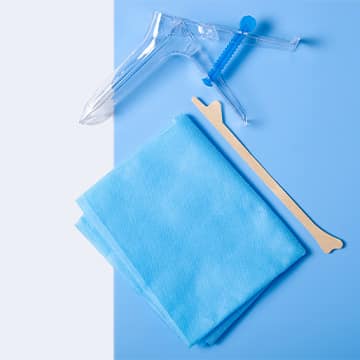
QUICK LINKS

What is a Pap Smear?
A pap smear is a procedure to test for cervical cancer. Detecting cervical cancer early on with a Pap smear can increase the chance for a cure. This test can also be used to identify changes in cervical cells that may be a sign of precancer.
A Pap smear is typically performed along with a pelvic exam. Generally, it is recommended that you begin to have Pap smears at the age of 21. In women over 30 years old, a Pap smear may also be combined with a test for human papillomavirus (HPV). Women ages 21-65 should receive this test every three years.
“I highly recommend Dr. Tepper!He is highly professional, experienced, and calming. My pregnancy and birth were such a positive experience thanks to him and his lovely staff at the clinic.”
SEE MOREThe Pap Smear Procedure
There may be some steps to take 48 hours ahead of time to prepare for your Pap smear. These may include avoiding sex, not using vaginal sprays, powders, or douches, and avoiding the use of tampons, medications, or creams in the vagina. You also should not have a Pap smear during your period, as heavy bleeding can affect the test results.
During the test, you will lie on the exam table with your feet placed in stirrups. A tool called a speculum will be inserted into your vagina for better visualization of the cervix. A swab will then be used to take a sample of cells from the cervix. This test should not be painful and usually takes about 10-20 minutes to complete.

MEET DR. ALEX TEPPER
Welcome to my practice. Let me introduce myself and my practice philosophy. I am a board certified OB/GYN in practice for over 20 years and have been a solo-practitioner on the Upper East Side of Manhattan since 2000. All deliveries are performed at The Mount Sinai Medical Center where I went to medical school and at Lenox Hill Hospital.
Pap Smear Results
Your Pap smear results will be sent to a lab and then be shared with Dr. Tepper. If your result is negative, that means that there weren’t any precancerous or cancerous cells found on your cervix. If your results are positive, it may be a sign of mild inflammation or a minor change in cells (dysplasia), an infection like HPV, precancer or cancer, or a lab test error. Depending on your results, you may need to have another Pap test in a few months to see if the abnormal cells have cleared. If they have not, you may need to have a procedure called a colposcopy to better assess your cervix.
Who Can Stop Having Pap Smears?
In some cases, a woman may no longer require Pap smears. These instances include women who have had a total hysterectomy due to a noncancerous condition, or those who are over the age of 65. Be sure to discuss these options with your doctor if you are interested in stopping Pap testing.
BOOK AN APPOINTMENT
Whether you are a new or returning patient, Dr. Tepper can assess your concerns and discuss your options to find the most comfortable and convenient care for you. To get started, call our office to set up an appointment.
CALL FOR APPOINTMENTContact Us to Learn More
If you have questions regarding Pap smears, are in need of a Pap smear, or would like to speak with a professional regarding this test, contact our New York office today. We will be happy to schedule your initial appointment with Dr. Tepper.
Our Blog

Your Guide to Understanding Placenta Previa

The Benefits of Having a Spanish-Speaking OB/GYN in Manhattan



